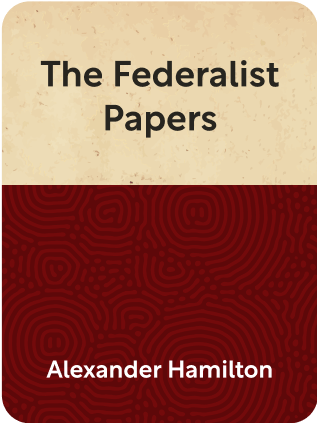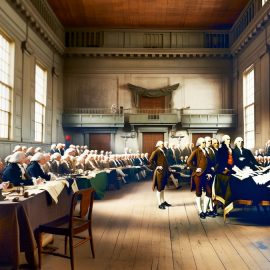

This article is an excerpt from the Shortform summary of "The Federalist Papers" by Alexander Hamilton. Shortform has the world's best summaries of books you should be reading.
Like this article? Sign up for a free trial here .
What makes an efficient government? How did The Federalist Papers address the concern of government waste?
Critics of the Constitution were concerned with an inefficient federal government. The Federalist Papers aimed to address their concerns by showing the possibility of an efficient government under the Constitution.
Read more about efficient government operations, particularly with revenue collection.
Criticisms About Inefficiency
Critics also feared that the new federal government would be too costly. But on this point, there was also little cause for concern. Many government functions assigned to the federal government under the Constitution were already being done by the states under the Articles of Confederation. Taxpayers might end up paying more for the federal government, but they would pay less for their state governments. It might have represented a change in paymasters, but not an increase in total costs.
Because much of the day-to-day administration would be done by the president, Congress (which had housed both legislative and executive functions under the Articles of Confederation and was therefore in constant session) would be able to adjourn more frequently. A part-time legislature would be a less burdensome public expense than a full-time one, increasing the possibility of an efficient government.
Lastly, state legislatures would be freed from having to handle national business, as they would no longer be the primary agents tasked with implementing mandates from Congress, as they had been under the Articles of Confederation. They would be able to devote their attention only to state affairs, which would cause them to be in session less frequently—further saving public expense.
Efficient Government Revenue Collection
A strong Union would also provide better and more efficient means of revenue collection than would a series of independent or semi-independent states. Given the difficulty and cost of assessing and collecting direct taxes (like income taxes) in the 18th century, most states raised revenue from indirect taxes, mainly in the form of duties on imported goods.
Giving the federal union the power of direct taxation wouldn’t just benefit public finances; it would also be good for the broader economy. If the federal government had to rely solely on customs duties and excise taxes (taxes on manufactured goods levied at the point of manufacture) for its revenue, it would have to tax these items at an extraordinary rate.

———End of Preview———
Like what you just read? Read the rest of the world's best summary of Alexander Hamilton's "The Federalist Papers" at Shortform .
Here's what you'll find in our full The Federalist Papers summary :
- The genius of the founding fathers in how they designed the United States Constitution
- Why it was critical for the United States to form a union rather than stay separated as colonies
- How Alexander Hamilton anticipated social issues that are still relevant today






